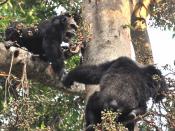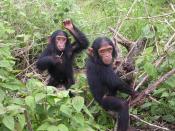The Mother's Role
In the chimpanzee society, an infant would not survive without his mother. A child is dependent on his mother from infancy through adolescence, thus making a mother/child relationship special, and a mother's role vital.
Births are relatively few in a chimpanzee community, making them something of an event (Goodall, Shadow 146). A mother will only have a baby once every four and a half to six years, and a group of thirty to forty individuals will have no more than one or two a year (146). According to Landau in Mother and Newly Born Infant "During the first months of life infants are completely dependent on their mothers for food and care." Nearly every hour a newborn will nurse for three minutes, and at night you can find the infant sleeping in her mother's arms high in a tree (Infant). A mother normally will protect an infant, less than five months old, from contact with other chimpanzees as well (Shadow 148).
However, this sheltering does cause some problems with the males, because if they are not allowed to examine the infant closely enough to fulfill their curiosity, they will begin to display, or leap around, swinging branches (147, 146). As the infant gets older, around three months, it will start to reach for other chimps sitting close by, but unless the other chimp is a sibling, the mother will quickly pull their hands away (148). Chimpanzees will start to move on the ground clumsily around six months of age. However, in tree branches they climb much more securely (Infant). A mother has to keep a watchful eye on her child as well as the other chimpanzees in the group during this period of growth, because the infant chimpanzee will start to interact with the elders and an...


